Key takeaways:
- Reflection in music education fosters personal growth, emotional connection, and self-expression, assisting musicians in clarifying their goals.
- Practices such as journaling, self-assessment, and sharing insights with peers enhance the reflective process and provide valuable feedback.
- Embracing challenges during reflection can lead to significant improvements and a deeper understanding of one’s emotional responses to music.
- Encouraging reflection among students through journaling, guided self-assessment, and peer feedback enhances their learning experience and artistry.
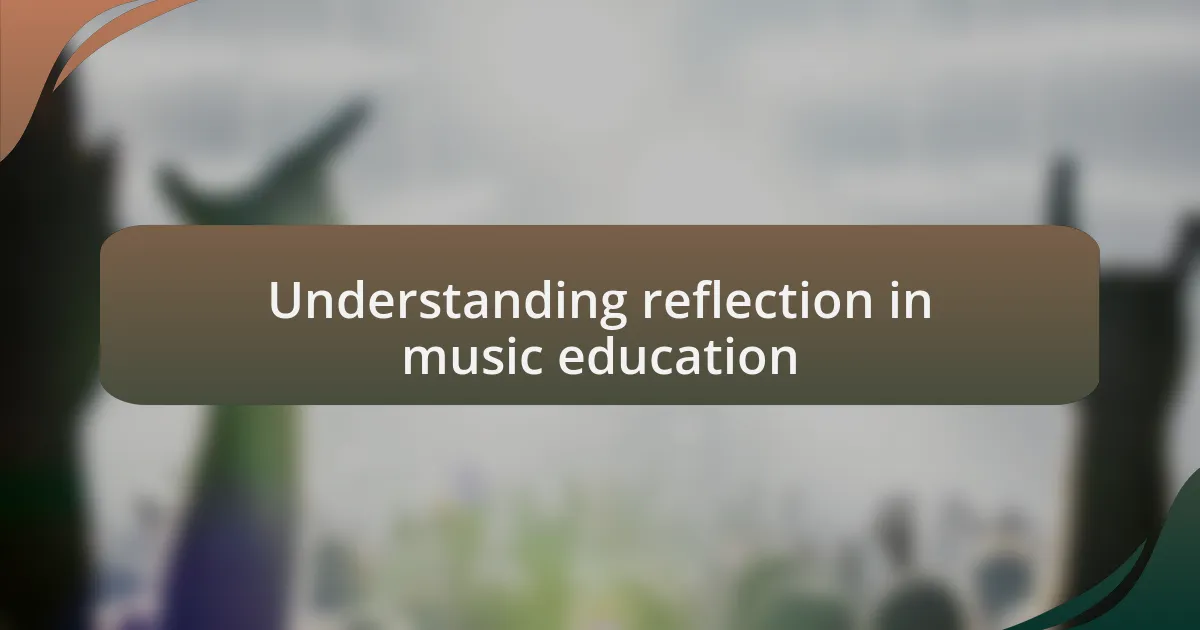
Understanding reflection in music education
Reflection in music education is more than just a critical look back at what has been learned; it’s an essential part of the growth process. I remember a time when I struggled with a complex piece on the piano. After each practice session, I would sit quietly, contemplating what went wrong and how I could improve. This practice of reflection helped me not only address technical issues but also understand my emotional connection to the music.
Engaging in reflection allows musicians to clarify their goals and intentions. Have you ever felt lost in a particular genre or style? I certainly have. Reflecting on those moments helped me identify what drew me to specific pieces, enabling me to align my practice with my passions. It’s a powerful realization, one that can transform a musician’s journey into a deeply personal exploration of self-expression.
Moreover, reflection encourages a deeper analysis of performance experiences. I often found it beneficial to record myself and then listen critically afterward. What emotions did I convey? Did I connect with my audience? This practice not only improved my technical abilities but also enhanced my emotional delivery, reminding me that music is about connection, both with the piece and the listeners. By taking the time to reflect, I discovered layers in my playing that I had overlooked before.
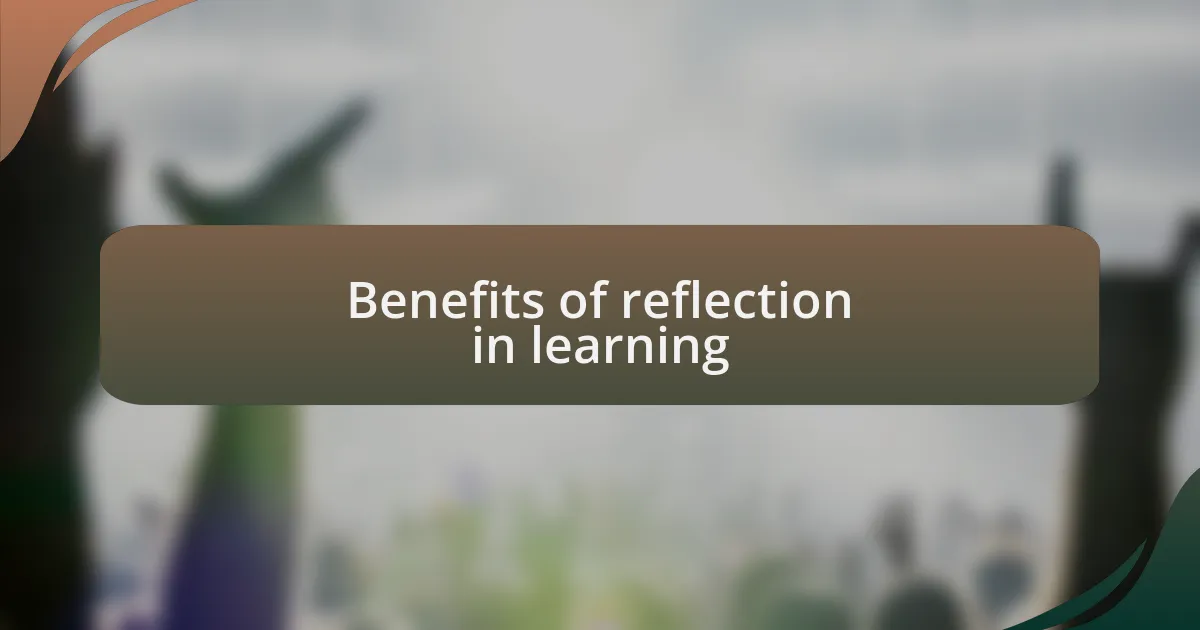
Benefits of reflection in learning
Reflection profoundly enhances the learning experience for musicians. I recall a rehearsal where I felt particularly disconnected from the music I was generating. Afterward, I took a moment to jot down my feelings and thoughts. This process revealed that my emotional state directly impacted my performance, emphasizing that reflection isn’t just an afterthought; it’s a vital component of artistry.
Additionally, the benefits extend to goal-setting and motivation. I have a habit of revisiting my practice logs, where my reflections often highlight gradual progress I might have otherwise overlooked. It’s motivating to see how far I’ve come! This practice also reinforces my commitment to improvement, helping me to stay focused on my long-term objectives while celebrating smaller milestones along the way.
Finally, reflection fosters adaptability in learning. I once faced a situation where my approach to a new piece wasn’t yielding the results I expected. By considering what wasn’t working and experimenting with different techniques, I discovered fresh pathways in my practice. Have you ever had to switch gears like that? The ability to adapt and adjust is often the key to unlocking creativity and growth, making reflection an indispensable tool for any musician.
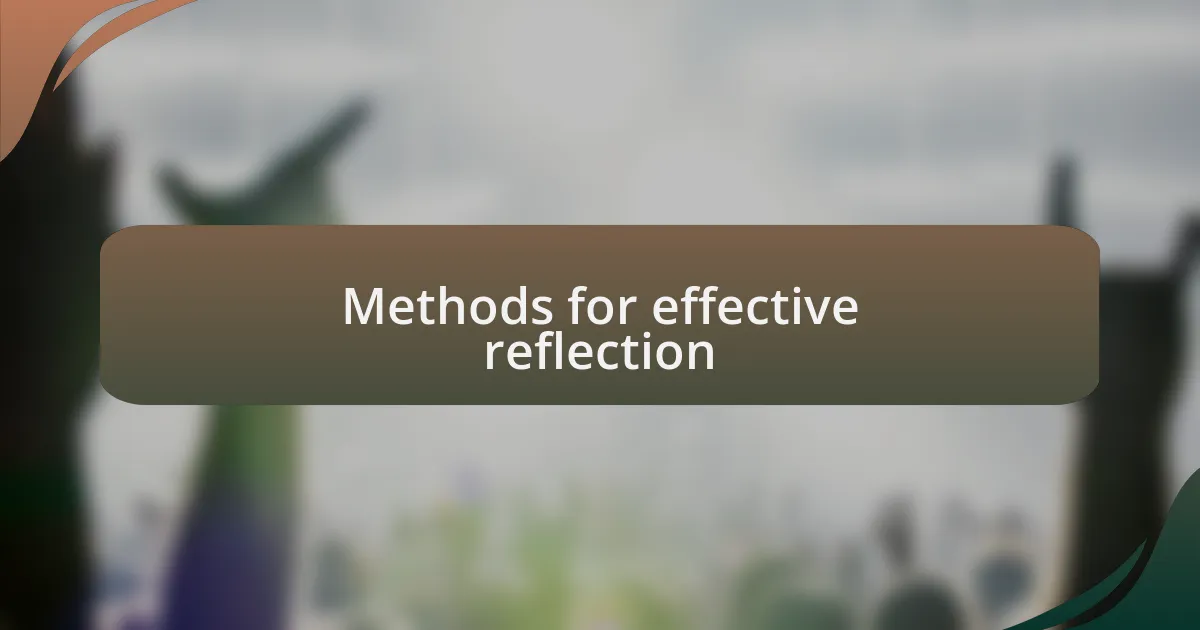
Methods for effective reflection
Engaging in reflection can take many forms, and one effective method I often use is keeping a dedicated reflection journal. I find it incredibly helpful to write my thoughts after practices or performances, detailing not only what went well but also what felt off. This kind of expressive writing not only allows me to articulate my experiences but also acts as a safe space for processing my emotions. Have you tried something similar? It might surprise you how much clarity can emerge from putting pen to paper.
Another method I’ve found beneficial is setting aside time for deliberate self-assessment. For example, during a recent practice session, I recorded myself playing a challenging piece. Listening back revealed nuances and areas for improvement I hadn’t noticed in the moment. By approaching each session with a critical ear, I can refine my techniques and deepen my understanding. This practice doesn’t just identify shortcomings; it amplifies the joy of learning, turning each obstacle into an opportunity for growth.
Additionally, sharing reflections with a mentor or trusted peer can significantly enrich the reflective process. I remember discussing my challenges with a fellow musician, and their insights were invaluable. It’s incredible how an outside perspective can shed light on my blind spots, helping me to reconsider my approach. Have you thought about who you might reach out to for feedback? Engaging with others not only broadens my perspective but also creates a support system that values reflection as an essential growth tool.
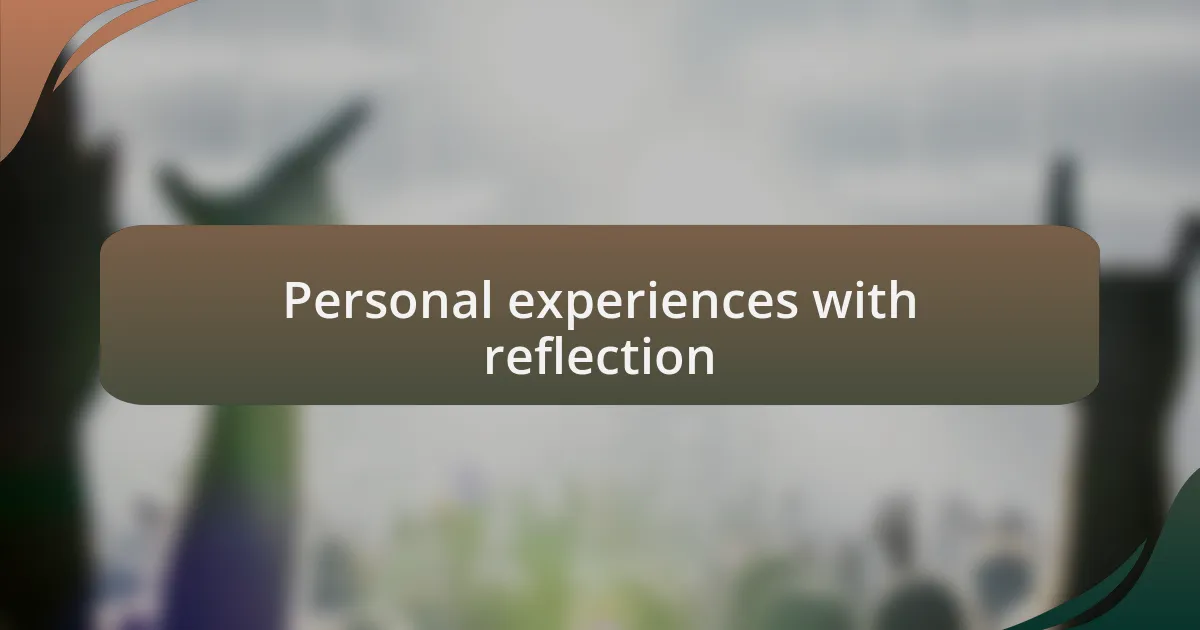
Personal experiences with reflection
One poignant experience I remember involved preparing for an important performance. I spent hours rehearsing, but it wasn’t until I took a moment to reflect on my emotions before stepping on stage that everything shifted. I realized I was more nervous than excited. Acknowledging that fear helped me channel my energy into passion, and that made all the difference in my performance. Have you ever noticed how just naming your feelings can empower you?
Looking back at my journey, I’ve often found that my most profound growth came from painful moments. After a particularly disappointing recital, I dedicated time to reflect on what went wrong. I poured out my thoughts in my journal, focusing on both my feelings of frustration and my unwavering desire to improve. This process allowed me to transform that disappointment into determined action, setting clearer goals for my next steps. Isn’t it fascinating how reflection can turn setbacks into stepping stones?
Talking through my reflections with fellow musicians has also proven invaluable. I recall one instance where a friend and I exchanged our experiences after a challenging rehearsal. Sharing our struggles and breakthroughs created a bond and provided unexpected insights that I hadn’t considered. That moment reminded me of the communal aspect of learning; sometimes, our reflections can become richer through collaboration. Have you found a similar connection with someone in your musical journey?
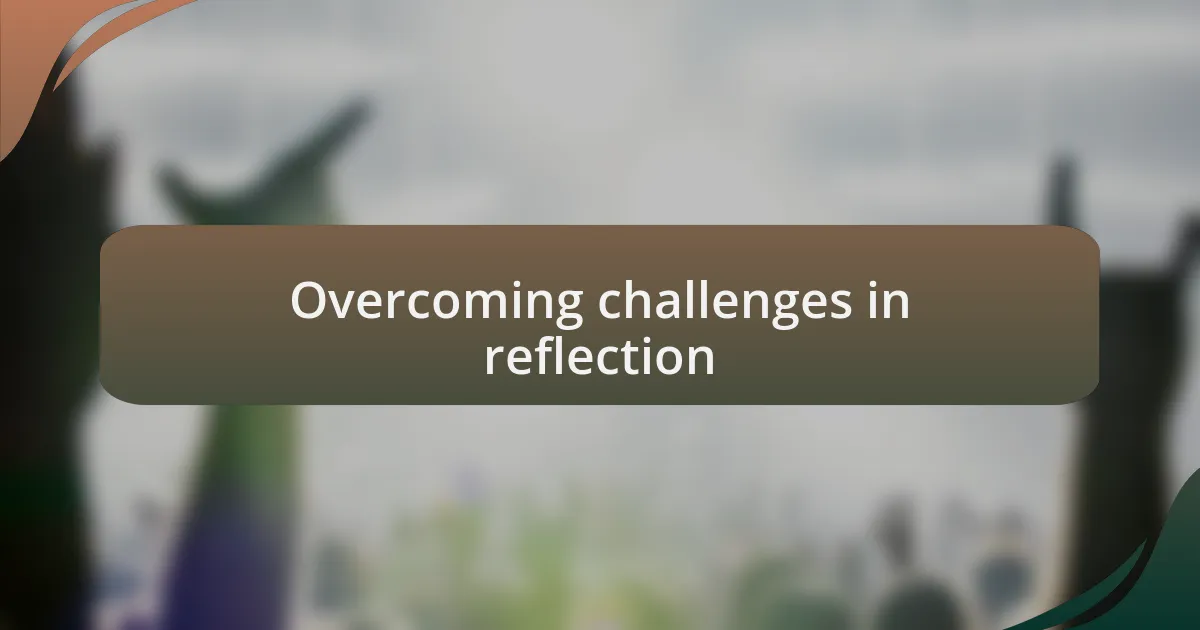
Overcoming challenges in reflection
Overcoming challenges in reflection can be a significant hurdle for many musicians. I vividly recall a time when I struggled to find clarity after missing a crucial note during a performance. At first, I felt frustrated and disheartened, but I realized that taking a step back and embracing that discomfort provided a unique opportunity for growth. How could I turn this feeling of inadequacy into a lesson? By meticulously analyzing what went wrong and understanding how I could prevent it in the future, I transformed a moment of doubt into a powerful learning experience.
Another challenge arises when emotions cloud our judgment during reflection. I remember feeling overwhelmed after receiving critical feedback from mentors. Instead of shutting down or becoming defensive, I learned to create a space where I could separate my feelings from the evaluation itself. What if I allowed myself to sit quietly with the feedback and consider its merits? Diving deep into those emotions helped me uncover valuable insights, leading to substantial improvements in my technique and confidence. Isn’t it remarkable how confronting our feelings can unlock greater understanding?
Sometimes, the act of reflection feels daunting, especially if you don’t know where to start. I once found journaling to be particularly helpful in sort out my thoughts after a tough rehearsal. Initially, the blank page intimidated me. But once I started writing freely about my experiences, everything fell into place. What if I just let my pen flow without worrying about grammar or structure? That liberated approach allowed me to tap into emotions I didn’t realize I had, paving the way for focused reflections that greatly enhanced my growth as a musician.
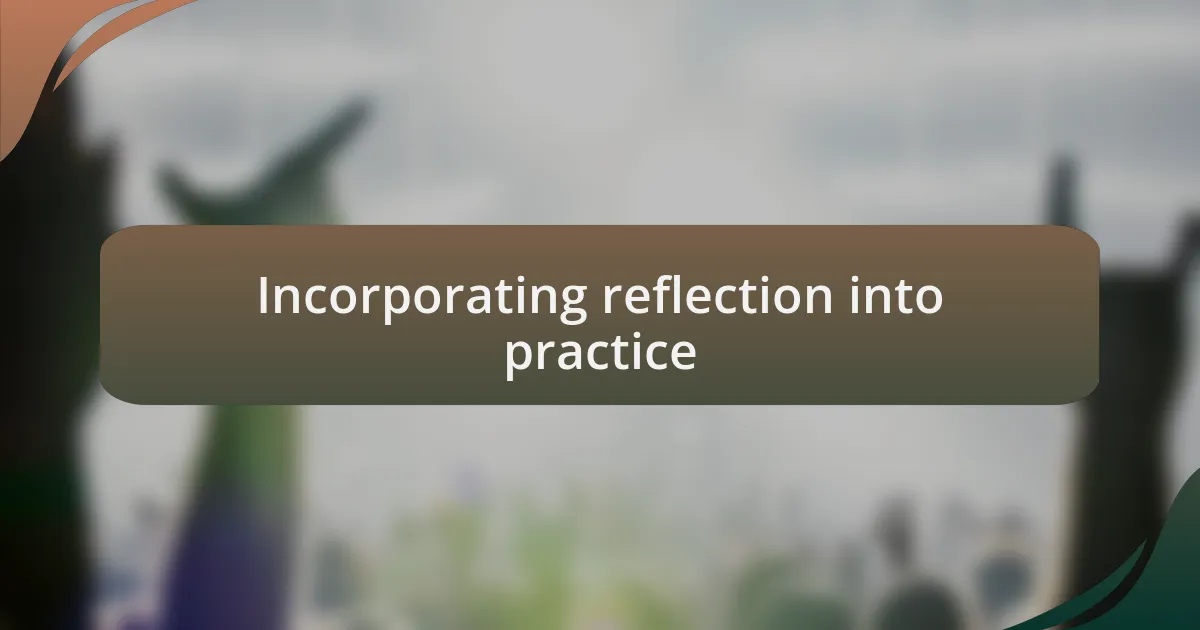
Incorporating reflection into practice
Incorporating reflection into practice can be a transformative experience, and one effective method I’ve found is through group discussions. During my time in a weekly ensemble, we often dedicated a portion of our rehearsal to share our thoughts on each other’s performances. I remember a specific session where someone pointed out a subtle timing issue that I had overlooked. It made me wonder, could a fresh perspective from a peer spark new ideas in my playing? Engaging with others not only enhances personal insight but also reinforces a culture of collaboration and support.
Another practical approach I’ve embraced is setting aside time after each practice session specifically for reflection. After playing through challenging pieces, I often pause to consider what went well and what areas still need work. There was a moment when I hit a rough patch in a particularly tricky scale; taking just five minutes to assess my technique cleared my mind and allowed me to target improvements effectively. How can such a simple act create pathways to mastery? By dedicating that time, I found clarity and purpose in my practice, making each session progressively more rewarding.
I also encourage the use of digital tools for reflection, as technology can enhance our ability to analyze performances. I started recording my practice sessions and then listening back to them—the first time was eye-opening. I hadn’t realized how inconsistent my rhythm was until I heard it played back. This method raises the question: how often do we truly listen to ourselves? Through these recordings, I’ve discovered not only areas for growth but also moments of joy in my playing that I might have otherwise missed. It’s a powerful reminder that reflection doesn’t have to be a solitary endeavor; it can be an adventurous exploration of our musical journey.
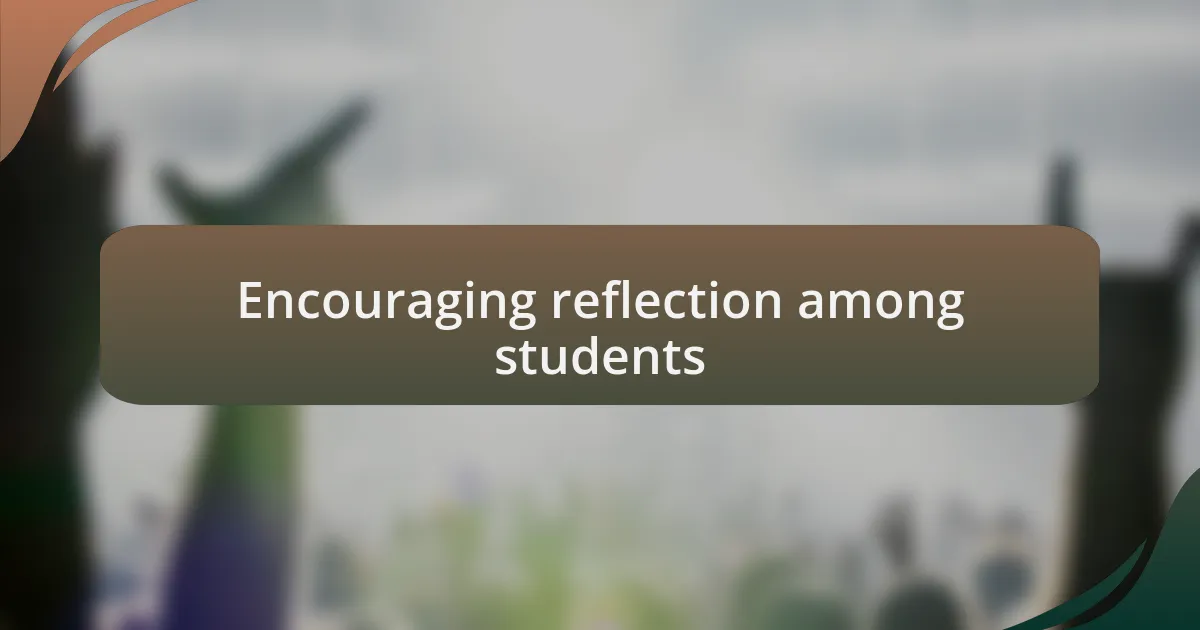
Encouraging reflection among students
To encourage reflection among students, I’ve often found that journaling can be a game-changer. Last year, one of my students began keeping a practice journal, detailing not just their technical challenges but also their emotional responses to various pieces they were working on. I was surprised to see how much deeper their understanding grew as they articulated their feelings about music; it made me think—how often do we ignore the emotional side of our craft?
Another effective method is guided self-assessment. I once facilitated a session where students rated their performances on aspects like expression, technique, and audience engagement. We gathered as a group after, and the discussions that followed were enlightening. I remember one student suddenly recognized a connection between their mood and their performance quality. This raised a critical question: could self-assessment not only clarify their strengths and weaknesses but also help them understand their artistry on a personal level?
Moreover, I encourage peer feedback as a way to spark reflective conversations. In one class, I paired students to share their thoughts about each other’s interpretations of a piece. The reactions were pure gold; I witnessed students lighting up as they validated each other’s musical choices. It led me to ponder—what might we discover through the eyes of others that we miss individually? It’s these moments of shared insight that can truly deepen a student’s reflective journey, transforming self-assessment into a collaborative exploration of music.